Stills from Don Palathara's Malayalam film 'Family', screening at the 14th Bengaluru International Film Festival on Sunday.
(Spoilers ahead)
All the world’s a stage… And one man in his time plays many parts. Four hundred years since the Bard made the observation, and as Marx would have said, the root of all art is man. Malayalam filmmaker Don Palathara’s films are chapters in character study, not mere slice-of-life observational ones, he doesn’t set up the camera and then leave, he’s very much present, in the way he manipulates the audience’s perception of the characters he deftly curates, mostly grey and morally ambiguous.
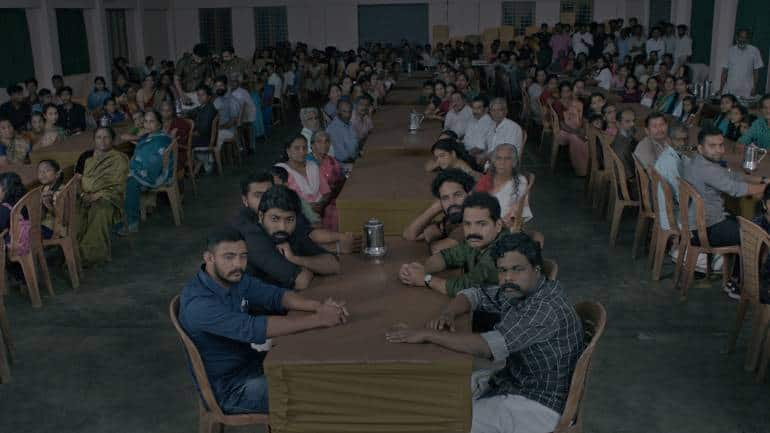 A still from 'Family'.
A still from 'Family'.
In his sixth film, Family, which premiered in the Harbour strand at International Film Festival Rotterdam (IFFR) last month, and will have its India premiere in the Indian Panorama section, on Sunday, March 26, at 7.30pm, Screen 3, at the Bengaluru International Film Festival (BIFFes, March 23-30), Palathara studies the individual in relation to his community, his environment. The community here is a village (in Kerala’s Idukki), is one big family, whose head is the omnipresent Church, which, like a panopticon, keeps surveillance. In Family, there’s a leopard on the prowl, literally and metaphorically, which the villagers are unable to catch, only the children can see.
It’s been four years since that spectacular Malayalam film Madhu C Narayanan’s Kumbalangi Nights. One remembers it for myriad reasons, one among which is, of course, Fahadh Faasil, as a never-seen-before Jekyll and Hyde Shammi, a bone gets stuck in the throat creating havoc in two families.
But once Shammi’s motivations are clear to those around him and to the audience, he’s declared sick and socially unfit. The villain is clear. In Family, the villain is an unsuspecting Everyman, the hero is the anti-hero. The feral wildcat who “won’t attack unless provoked”.
Vinay Forrt’s goody-two-shoes Sony is a good Samaritan his community swears by. He does charity, recues a cow that falls into the leopard-trap ditch, tutor youngsters, advises them to take PSC exams, climbs trees to pick jackfruit for an acquaintance, peels beans for a pregnant woman, spouts progressive platitudes.
But the walls that hide know it.
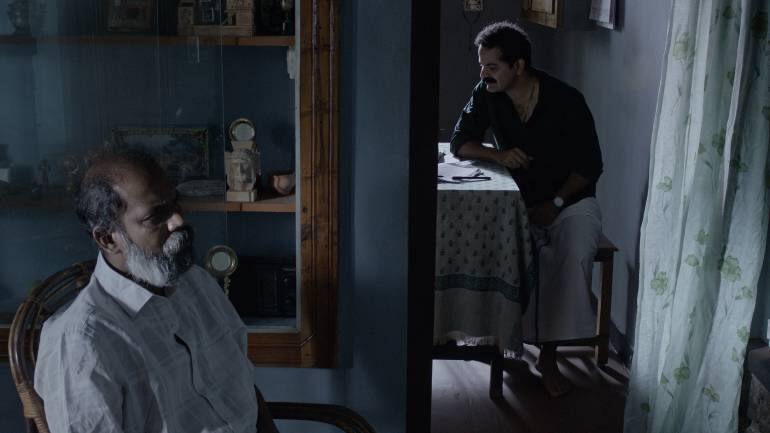 Vinay Forrt (right) in a still from 'Family'.
Vinay Forrt (right) in a still from 'Family'.
A younger boy checks for, perhaps, love-bruise marks on him, or a girl is susceptible to sexual harassment at the hands of her math tutor even as her father sits outside the room watching TV. The act is never shown, but real life equips the audience, especially women and gender minorities, with the knowledge of the unknown. Palathara opts for elliptical storytelling over expository. He will show the before or after of an action/incident and not the action itself. Carefully crafted, and yet so organic, the credit for mounting a character like Sony in his centripetal ecosystem, which closes in rank, partly goes to co-writer Sherin Catherine, who knows what Palathara expects of his characters having faced his camera in Everything is Cinema, which had premiered at IFFR, as well, in 2021.
Forrt’s unassuming man-next-door personality makes him an apt choice for the liminal likeable-unlikeable role that he essays slithering-ly. He’s extraordinary in his ordinariness.
Family is a horror film. We have been lied to that horror is always an alien force, horror is far more insidious when it manifests in the familiar. Like Simmy (Grace Antony), in Kumbalangi…, who says sorry to Shammi once he’s in his toxic zone, in Family, Neethu (Nilja K Baby) says sorry to Sony when he plays the victim card. Aah, men, and how they gaslight! Neethu is that village-ostracised girl whom Sony lends a shoulder to, builds a pucca road to her place — and builds her hopes — after her father dies and the villagers have to walk through the jungle (it’s a spectacular single-take shot, where one hardly notices Sony slithering in and out of the crowd in funeral procession when his evil intention finds no fruition). Women have to bear the cross of honour and shame, while men can have their “silly” ways, and their “sins…absolved” by the vicar/Church with a confession. The nun/Church will also provide for Sony: a retreat, a high-school teaching job and a wife to rewire his life.
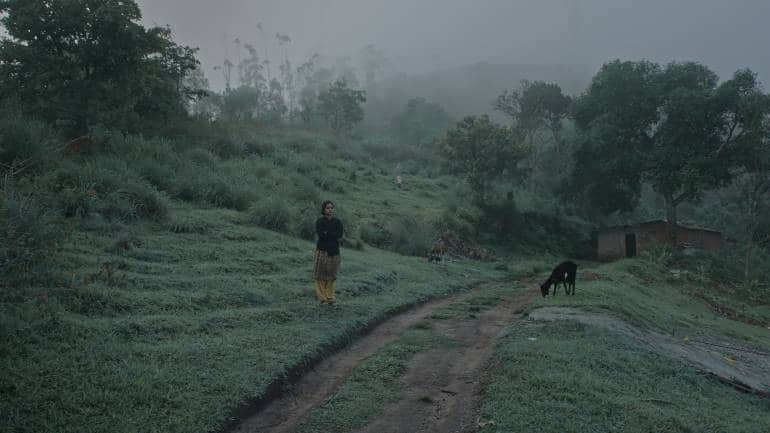 A still from 'Family'
A still from 'Family'
The camera stays static. Out of the stillness of a verdant Idukki emerges a creature, in green. Sony will be wearing variants of green shirts through the film, except when he’s supposed to be in “pure” spaces, meeting the vicar at the church or his future wife’s family, the shirt becomes white, but not in the school. Family, like his Rima Kallingal-Jitin Puthenchery-starrer Santhoshathinte Onnam Rahasyam/Joyful Mystery (2020), is a colour movie, which means indie filmmaker Palathara had a little more money (and producers) and, unlike his greyscale/black-and-white films (Shavam; Vith; 1956, Central Travancore; Everything is Cinema), where the audience can look anywhere on the screen and make a film of their own, in these coloured films, Palathara is directing our gaze to one film, as he wants to show it.
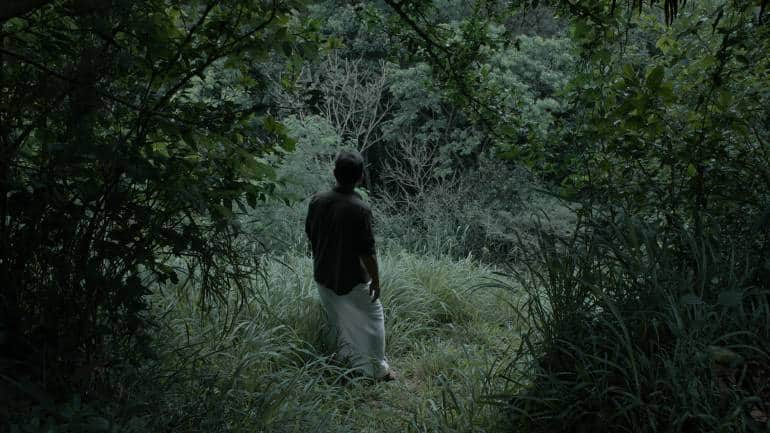 A still from 'Family'
A still from 'Family'
Green signals the ominous. It is part of a “continuum” that is soon becoming a Palathara signature: whether of a colour to signal the outside-inside (green clothes to establish Mother Nature-human nature continuity, also seen in Joyful Mystery; and the bluish-grey claustrophobic walls inside the houses merge with the overcast skies in Family); or shot continuum, if at the end of Shavam (2015), the camera goes from the people on to the hills, in Family, the fear-frozen children’s faces as they see the leopard is juxtaposed with the frozen frame of Sony’s shocked face in the school, what he sees, we don’t get to know. Palathara leaves you at seen.
In the second half, the camera will focus-out from a green-shirted smooth-operator Sony — craftily wielding the victim card — on to a green tree snake in the foreground. Where one nature ends and the other begins is a bokeh blur.
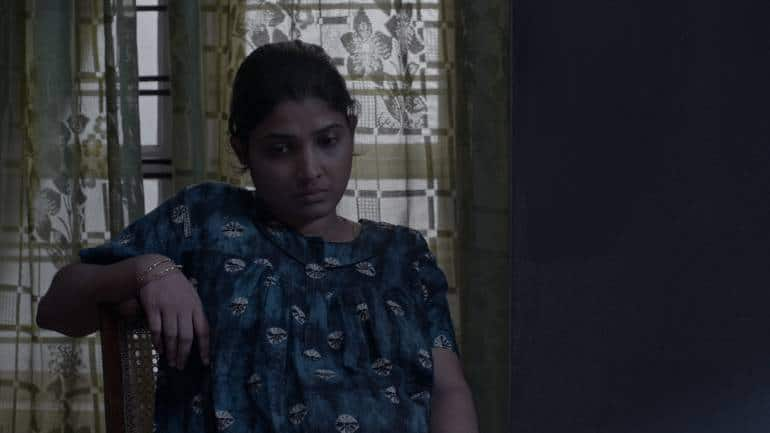 Divya Prabha in a still from 'Family'.
Divya Prabha in a still from 'Family'.
The only adult who raises an alarm is a woman, muted by other women. A pregnant Rani — essayed by Divya Prabha — is shut down by fellow women of the village, and by the nun, the foot-soldier of the Church. Prabha is a neat actor, even with her silences she commands any scene she’s in. Like her Rashmi who faces misogyny in Mahesh Narayanan’s Ariyippu/Declaration (2022), Prabha’s Rani’s eye-witness account is shunned as “gossip”, seen as an attempt to malign the “upright” Sony’s character. It reminds of #MeToo survivors whose accounts are rubbished because the allegations are against “respectable” men/artistes; look no further, one of the biggest, critical cases is in the Malayalam film industry itself.
In Family, the cunning feral-feline creature in human skin is an obvious juxtaposition. Sonys are like that elder cousin or younger uncle in an extended family who’s held up as an ideal, old enough to be the community’s voice of conscience and young enough to be paid heed to by the rebellious young. They seem unsuspecting but unfurl their fangs in private. Like Dostoevsky’s Raskolnikov, Sony has been taught to normalise/rationalise transgressions, perhaps, from his own life-experiences, his childhood, and the blame must fall squarely on the family, the community and institutionalised religion that shield many a delinquent Sony. But unlike Dostoevsky, Palathara is harsh, doesn’t allow any interiority or redemption to his protagonist. There’s not an iota of psychological realism, we never get to know what’s going on in Sony’s mind, what are his intentions and motivations, what does he feel, does he ever feel any remorse or guilt for his actions?
The mid-shots are just enough for us to see Sony’s expressions but not close-enough to reveal what’s hidden beneath this veneer. Sony, we are told by others, fears the father, both religious and biological (his patriarchal father would make his wife massage his feet while discussing about their son with the omniscient nun). The father-son conversations are bare minimum, and if it were the case, unlike Franz Kafka, Sony won’t muster the courage to write a letter to his father calling him out as emotionally abusive.
Producer Newton Cinema has intriguingly, perhaps not intentionally, been backing projects that tangentially depict the adult-child fairytale-gone-wrong dynamics, whether in Family, or Megha Ramaswamy’s Lalanna’s Song, or Varun Grover’s Kiss.
Grover had said in one of his stand-up acts that since childhood, “one thing every Indian kid is taught is conformism”. To dissent is to become an anomaly, an anti-what-have-you, for a family governed by a patriarch, or a community governed by a religious body, albeit “benevolent”, are only a microcosm for the nation at large, every rusted cog results in the whole machine to collapse, and so this centre (Church) must hold (and exert its power), lest things fall apart in this community/village/family.
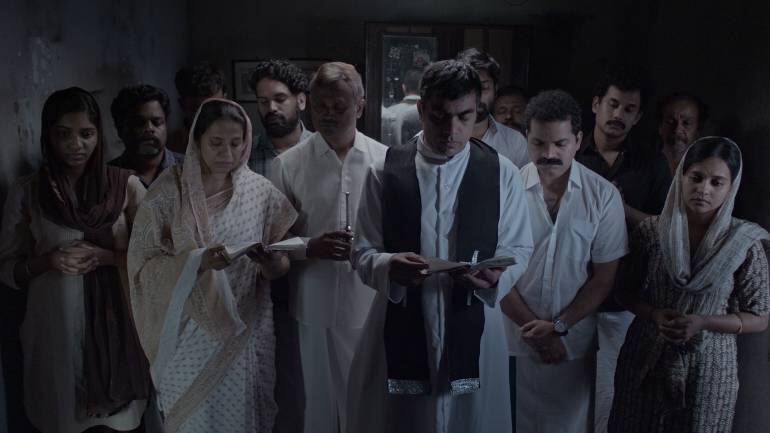 A still from 'Family'.
A still from 'Family'.
Modern nations, to borrow Benedict Anderson’s coinage are “imagined communities”. And, unlike a society, wherein all differences assimilate and cohabit, a community is built on “sameness”, discarding individual variations. The community/collective subsumes the individual, strips off their agency. In a community, everybody speaks the same language, no, not referring to Malayalam here, but the language of a singular discourse: in the case of Family, it is the Church’s supremacy and omnipresence in the lives of the villagers. Peppered across all of Palathara’s films are Christian imagery, motifs, symbols; in Family, they take centre stage.
Family is a taut, compellingly written. And Renganaath Ravee’s (Lijo Jose Pelissery’s Jallikattu) sound design, mostly natural sounds, like the film’s editing, is eerily controlled, lending the film a Hitchcockian tension, for emphasis.
Here’s a man looking at men’s stories, and, thus, the women, their stories and their roles (caregiver, “honour” machine) are male-prescribed. By his own admission, there’s a part of Palathara in all his actors, very few directors sketch the toxic, the shades of grey so skilfully, and be self-critical and self-reflective while doing so (Everything…, Joyful…). Palathara’s filmmaking exists in its own universe of “grey cinema”.